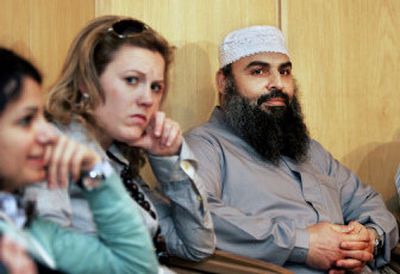CIA agents not present as their trial begins in Italy

MILAN, Italy – As President Bush headed for Italy Friday, a Milan court opened the trial of a group of CIA agents accused of kidnapping a radical Egyptian cleric – the first legal prosecution of one of the administration’s most controversial counterterrorism tactics.
Twenty-six American defendants, including two CIA station chiefs and an Air Force colonel, are being tried in absentia for the 2003 abduction from a Milan sidewalk of a cleric known as Abu Omar.
The tactic under scrutiny in the Milan case is known as extraordinary rendition. It involves the capture of a terrorism suspect in one country by representatives of a second and his transfer to a third country for interrogation, without court orders or judicial oversight. In many cases, including this trial, the suspects have claimed they were tortured. Human rights officials accuse the Bush administration of using scores of extraordinary renditions to “outsource” torture, a charge Washington, D.C., denies.
All the Americans left Italy before the first arrest warrants were issued two years ago, and none is expected to cooperate with the Milan proceedings.
This gave a sort of “virtual reality” feel to Friday’s court session.
Judge Oscar Magi opened the trial, reading the indictment and ticking off the Americans’ names, repeating, 26 times: “Fugitive.”
“Fugitive.”
“Fugitive.”
Court-appointed defense attorneys for each of the American defendants filled the courtroom, but the metal cages along the walls that usually contain suspects were empty. Most of the defense attorneys have never met or communicated with their clients, and in many cases don’t even know their real names, as they allegedly used aliases in the Abu Omar operation.
Seven Italians are also charged, including the country’s former top spymaster and his No. 2, who are accused of sanctioning or aiding in the CIA kidnapping.
The Milan prosecution, along with similar cases in Germany and Switzerland, exposed the policy of renditions, which Bush eventually was forced to acknowledge. Only in Italy, however, has such a case gone to trial, a public forum that threatens further to illuminate the actions of CIA operatives and the long-denied complicity of their European counterparts.
“We want to punish terrorists – but in the courtroom,” Milan’s lead prosecutor, Armando Spataro, said in commenting on the significance of the landmark trial. The war on terrorism, he said, should be waged “within the full respect of the laws of our Western democracies.”
In an uncomfortable coincidence for American officials that highlighted the ongoing strain in U.S.-Italian relations, the trial in Milan started just hours before Bush arrived in Italy for a day-and-a-half visit following the G-8 summit in Germany.
The trial was adjourned until June 18 while Judge Magi decides whether to suspend the proceedings to await a ruling on a constitutional challenge to the case.
The Italian government has asked the constitutional court, highest in the land, to void the indictments because of concern that prosecutors will use state secrets to make their case.
Abu Omar, whose full name is Osama Hassan Mustafa Nasr, remains in Egypt, where he spent more than three years in prison after CIA operatives allegedly abducted him and flew him to Cairo on a private plane that took off from the U.S.-run Aviano air base in northern Italy.
In jail, he has said he was beaten, threatened with rape, shocked with electricity, tied to a wet mattress and left in a tiny cell crawling with rats. He continues to suffer from permanent injuries, including a back injury and loss of hearing in both ears, said his lawyer, Montasser Zayat.